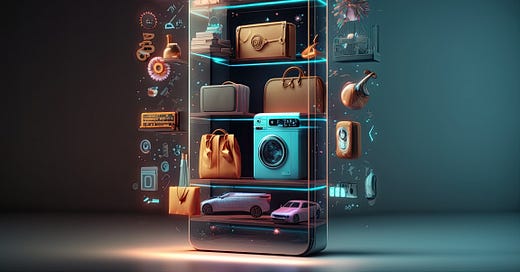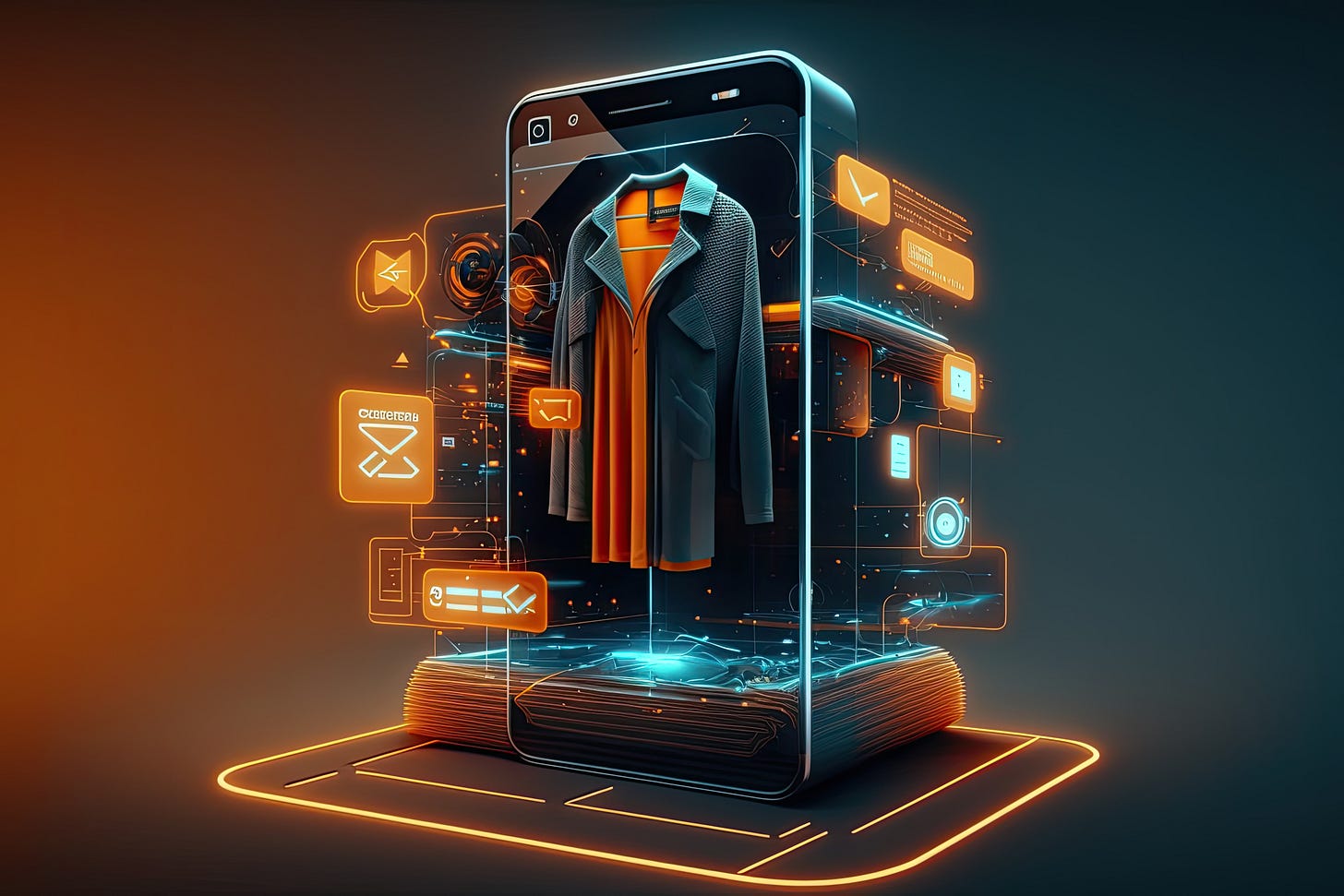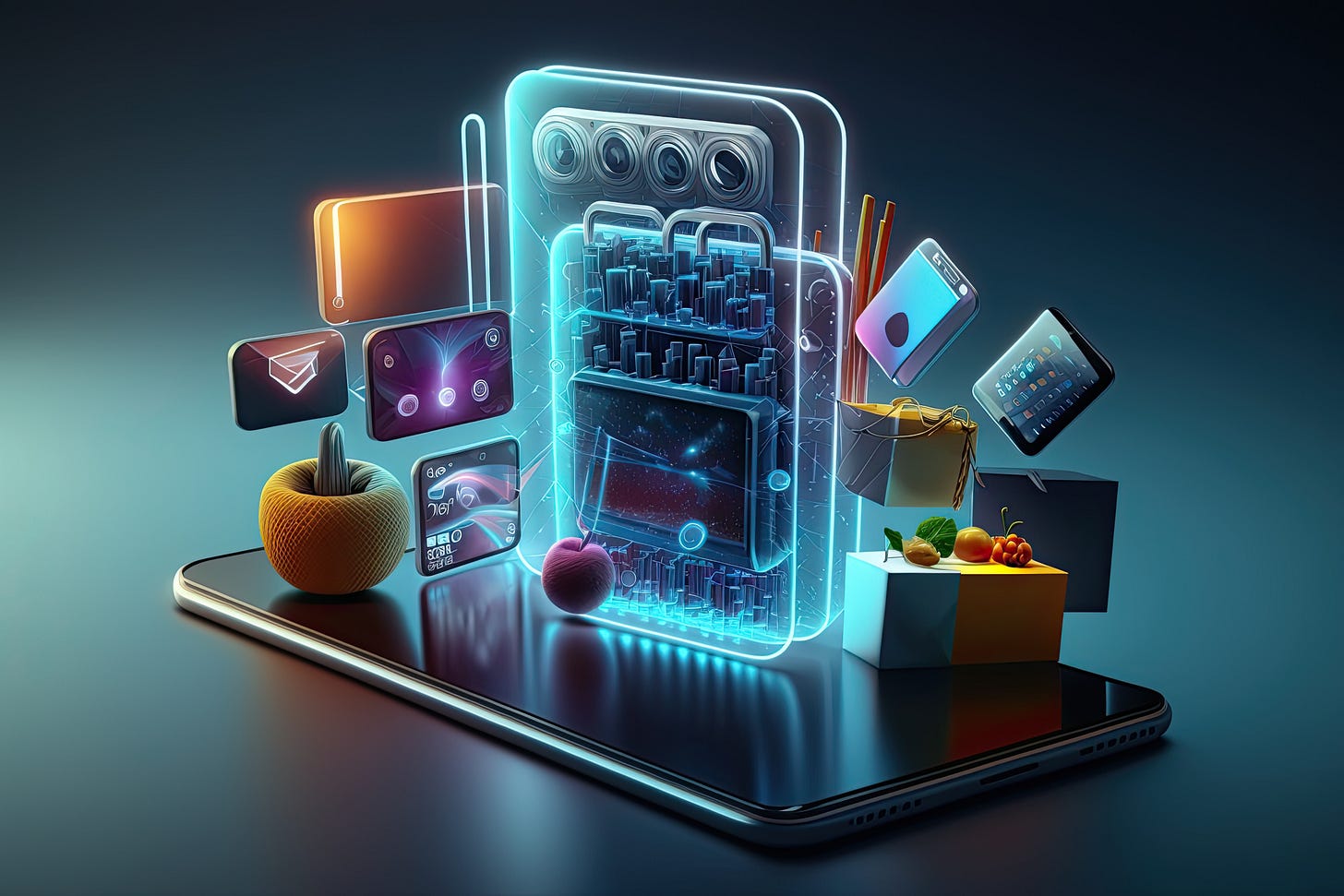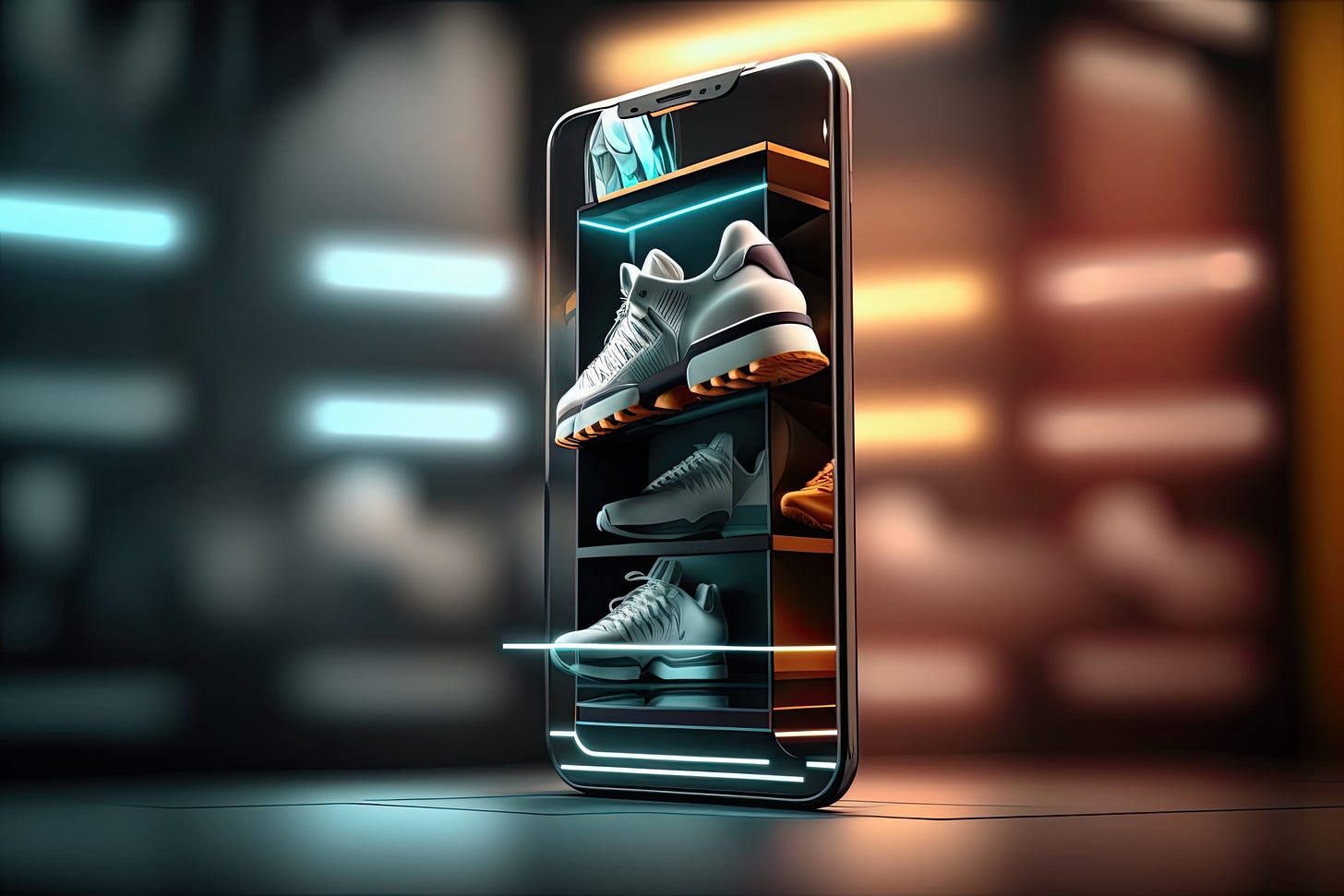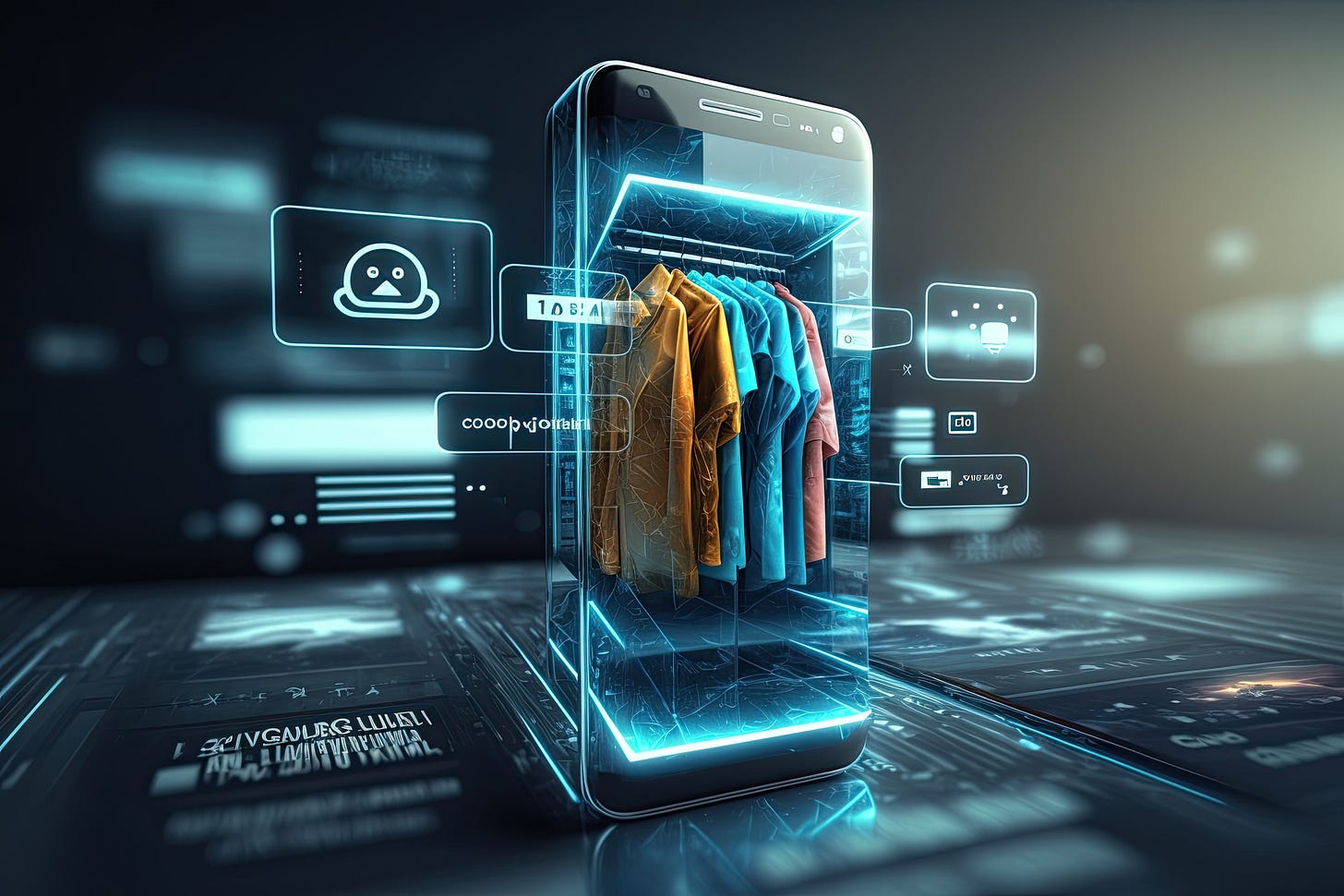Issue 002: The Evolution and Expectations of Tomorrow's Consumer
🛍️🌍 From Clicks to Conscious Choices: Navigating the New Age of Consumerism
Bi-weekly writing about cultural shifts and next-generation start-ups building for the ‘consumer of tomorrow’. If you haven’t subscribed, join other like-minded future-forward thinkers by subscribing here:
TL;DR:
Historical Evolution of Shopping: The retail industry has witnessed significant transformations, moving from traditional brick-and-mortar outlets to e-commerce platforms. This evolution has been influenced by technology, changing demographics, and societal values, with milestones like the rise of department stores, the dominance of e-commerce, and the shift towards conscious consumerism.
The Evolving Digital Consumer: Modern consumers are digitally connected, prioritize sustainability, and seek immersive shopping experiences. They value personalization, are informed, socially influenced, and prioritize health and wellness. Emerging technologies, such as AR and VR, enhance their shopping journey, while a blend of online and offline interactions is expected.
Visionary Brands Setting the Pace: Brands like Patagonia, Amazon, Nike, Airbnb, and Spotify are leading the way by actively responding to the changing demands of consumers. These brands prioritize sustainability, personalization, and enhanced user experiences, showcasing adaptability and foresight in the dynamic marketplace.
The Rise of Conscious Consumerism: Modern shoppers are more aware and conscious of their choices, emphasizing sustainability and ethical practices. Brands that demonstrate environmental responsibility, transparency, and corporate social responsibility are preferred, indicating a strong move towards ethical consumption and corporate accountability.
🛍️ A Whirlwind Timeline of Trendsetting Shoppers
Buckle up, dear reader! We're embarking on a time-traveling spree through the ever-twisting, constantly evolving aisles of shopping history. From quaint neighborhood boutiques to the flashy universe of e-commerce, the shopper has had quite the roller-coaster ride.
Remember the good ol' days when shopping was all about the local ma-and-pa stores? The days when shopping lists were penned on paper, not tapped into smartphones. It was personal, it was local, and oh boy, was it limited.
Enter the industrial whirlwind. With it came bigger stores, glittering window displays, and an explosion of choices. Shoppers transformed into consumers, brand enthusiasts even, serenaded by jingles from cleverly crafted advertisements. Let’s all take a moment to remember the unbeatable Britney Spears x Pepsi jingle, which should have been its own single.
Then, just as we were getting comfortable, the internet waltzed in, turning shopping carts virtual. Online marketplaces became the rage, with deals, steals, and an avalanche of recommendations. And when smartphones joined the party? Shopping was literally at our fingertips! Suddenly, everything was available on demand. Craving a midnight snack or a spontaneous getaway? There's an app for that.
Now, in today's kaleidoscopic shopping scene, it's not just about buying. It's about living the experience. Stores aren't just spaces; they're theatrical stages. Think virtual reality fitting rooms, augmented reality product demos, and pop-up events so mesmerizing you'd think they were Broadway shows! Just take a look at the initial hype marketing for Pokemon GO - you are immediately transported into a world of new possibilities.
But wait – there's more. Today's shopper isn’t just swiping their card. They're voting for the planet, championing sustainability, and cheering for brands that wear their ethical heart on their sleeves. The call for transparency and a good dose of corporate kindness isn't just a trend; it's a revolution.
And as we dance through this ever-shifting shopping saga, one thing's clear: the shopper isn’t just evolving. They're reinventing, reshaping, and, quite frankly, ruling the retail universe. Strap in, because this journey, sprinkled with tech marvels, societal shifts, and a sprinkle of rebellion, is far from over!
🌟 From Today's Click-Happy Shopper to Tomorrow's Digital Dynamo
The "modern consumer" refers to individuals in the present era who actively participate in the marketplace and engage in various consumption activities. This term encompasses the behaviors, preferences, and expectations of individuals in the contemporary world. Here are some key characteristics that define the modern consumer:
Digitally connected: Modern consumers are highly connected to the internet and utilize various digital platforms and devices to gather information, make purchasing decisions, and engage with brands. They often rely on online reviews, social media, and e-commerce platforms for product research and shopping.
Tech-savvy: The modern consumer is comfortable using technology and embraces innovations that enhance their shopping experience. They are open to using mobile apps, voice assistants, smart devices, and other emerging technologies to streamline their purchasing process and access personalized recommendations.
Empowered and informed: With easy access to information, modern consumers are well-informed about products, brands, and market trends. They conduct thorough research, compare prices, read reviews, and seek recommendations from their social networks before making purchasing decisions. They value transparency and expect brands to provide detailed information about products and services.
Value-oriented: While price remains an important factor, modern consumers also prioritize value for money. They seek products and services that align with their needs, preferences, and values. Quality, sustainability, social responsibility, and ethical practices are increasingly important considerations for the modern consumer.
Experience-driven: Modern consumers value experiences over mere transactions. They seek personalized, seamless, and memorable experiences throughout their customer journey. Brands that can create engaging and immersive experiences, both online and offline, have a competitive advantage in capturing the attention and loyalty of modern consumers.
Socially connected and influenced: Modern consumers are connected to social networks and rely on peer recommendations and influencer opinions to inform their purchasing decisions. Social media influences 71% of consumer buying decisions. They actively engage with brands through social media, share their experiences, and seek validation from their online communities.
Convenience-oriented: The modern consumer values convenience and expects seamless shopping experiences. They appreciate options like fast and reliable shipping, hassle-free returns, flexible payment methods, and personalized recommendations that save them time and effort.
Multi-channel shoppers: Modern consumers engage with brands across multiple channels, such as physical stores, websites, social media, mobile apps, and marketplaces. They expect consistent and integrated experiences across these channels, with the ability to switch between them effortlessly.
Demand for customization: Modern consumers appreciate customization and personalization options. They seek products and services tailored to their specific needs and preferences, and they are willing to pay a premium for personalized experiences.
Sustainability and social consciousness: Increasingly, modern consumers are concerned about environmental sustainability and social impact. They prefer brands that demonstrate environmental responsibility, ethical sourcing, and contribute to social causes.
It's important to note that these characteristics may vary among different demographics and consumer segments, and the definition of the modern consumer continues to evolve as new technologies, trends, and societal changes emerge. Predicting consumer behavior with certainty is challenging, as it depends on various factors and can be influenced by unexpected events. However, based on current trends and emerging developments, here are a few potential areas where consumer behavior may evolve in the next five years to become ‘the Consumer of Tomorrow’:
Continued Growth of E-commerce: The growth of e-commerce is likely to continue as consumers increasingly embrace online shopping for convenience, product variety, and competitive pricing. Mobile commerce, social commerce, and voice-activated shopping may further gain traction, with consumers using smartphones, social media platforms, and voice assistants for seamless and personalized shopping experiences.
Increased Demand for Sustainability: The focus on sustainability and ethical consumption is expected to intensify. Consumers will likely prioritize brands that demonstrate environmental responsibility, ethical sourcing, and social impact. According to a survey from McKinsey & Co., 66% of all respondents and 75% of millennial respondents say that they consider sustainability when they make a purchase. There may be a rise in demand for sustainable products, packaging, and practices, and consumers may reward companies that actively address climate change and promote social causes.
Emphasis on Personalization: Consumers will continue to seek personalized experiences and tailored recommendations. Advances in data analytics, artificial intelligence, and machine learning will enable brands to gather and analyze customer data, leading to more accurate personalization of products, services, and marketing messages. Hyper-personalization may become more prevalent, offering unique and highly relevant experiences.
Growth of Augmented Reality (AR) and Virtual Reality (VR): AR and VR technologies have the potential to transform the way consumers shop and experience products. Virtual try-on, virtual showrooms, and immersive shopping experiences may become more common, providing consumers with a realistic and interactive way to explore and engage with products before making purchasing decisions. For example, Walmart acquired virtual fitting room technology to elevate its customer experience.
Increased Emphasis on Health and Wellness: The COVID-19 pandemic has amplified the focus on health and wellness. Consumers are likely to continue prioritizing products and services that promote well-being, hygiene, and immunity. The demand for fitness trackers, smart home devices, organic and natural products, and telehealth services may increase as individuals seek to maintain their health and well-being.
Rise of Voice Commerce and Smart Assistants: Voice-activated assistants like Amazon's Alexa, Google Assistant, and Apple's Siri are becoming increasingly integrated into consumers' lives. Voice commerce is expected to grow, allowing consumers to make purchases, reorder items, and get product recommendations through voice commands. Brands will need to optimize their presence and marketing strategies for voice-activated platforms.
Shifting Demographics and Generational Preferences: As younger generations, such as millennials and Gen Z, continue to gain purchasing power, their preferences will influence consumer behavior. These generations tend to value sustainability, social responsibility, and experiences, which will shape their consumption patterns. Additionally, as the population ages, there may be increased demand for products and services catering to the needs of older adults.
Privacy Concerns and Data Security: Consumers are becoming more aware of data privacy issues and may become more cautious about sharing their personal information. Brands that prioritize data security, transparency, and offer clear privacy policies will likely gain trust and loyalty from consumers.
🔮Defining the Archetype of the ‘Consumer of Tomorrow’
The consumer of tomorrow is a digitally connected individual who embraces technology and relies on it to enhance their shopping experience. They seamlessly navigate online and offline channels, utilizing e-commerce platforms, mobile apps, and voice assistants for convenience and personalized recommendations. This consumer values hyper-personalization and expects brands to understand their individual preferences and offer tailored products, services, and marketing messages. Sustainability and ethical consumption are core values for the consumer of tomorrow. They prioritize brands that demonstrate social and environmental responsibility, seeking out products that align with their values. Transparency, ethical sourcing, and sustainability initiatives are key factors in their purchasing decisions. They are willing to pay a premium for sustainable and ethically produced products.
The consumer of tomorrow seeks immersive and experiential shopping experiences. They value unique and interactive encounters with brands, both online and offline. Augmented reality (AR), virtual reality (VR), and other emerging technologies provide them with realistic and engaging experiences before making purchasing decisions. This archetype values convenience and expects seamless omnichannel experiences. They want consistent interactions and easy transitions between physical stores, websites, social media platforms, and mobile apps. Companies that can provide integrated and frictionless shopping experiences across multiple touchpoints will capture their attention and loyalty.
Health and wellness are important priorities for the consumer of tomorrow. They prioritize products and services that promote well-being, mental health, and sustainability. They engage with brands that offer personalized nutrition, remote healthcare monitoring, and other technologies that support their physical and mental well-being. The consumer of tomorrow is socially connected and influenced. They seek validation and recommendations from peers, influencers, and user-generated content on social media platforms. Influencer marketing and social validation play a significant role in shaping their purchasing decisions.
Overall, the consumer of tomorrow is a tech-savvy, conscious, and experience-driven individual who expects personalized, sustainable, and convenient shopping experiences. They are empowered, socially connected, and seek brands that align with their values and provide seamless integration between the digital and physical worlds.
🌟 Brands Taking the Lead Building for Tomorrow
As we journey further into the heart of the evolving marketplace, I wish to shine a spotlight on some visionary brands that are not merely reacting to change but are actively shaping the future of consumer engagement.
Patagonia: A beacon of sustainability, this revered outdoor apparel brand goes beyond mere lip service to environmental causes. Their tenacious commitment to ethical sourcing, recycled materials, and fair labor practices isn't just commendable; it's an embodiment of their brand identity. In this era of conscientious consumption, Patagonia stands tall, urging us all to be more discerning in our choices.
Amazon: Here's a giant that needs no introduction. Spearheading the e-commerce revolution, Amazon has deftly anticipated and catered to the digital consumer's needs. Their foray into voice commerce with Alexa is just another testament to their commitment to redefining and streamlining our shopping experiences.
Nike: Stepping beyond the realm of athletic prowess, Nike has made waves with its Nike By You platform, embracing the trend of personalization with gusto. Add to that their environmental initiatives like the Nike Grind program, and we have a brand that's listening keenly to the shifting winds of consumer demand.
Airbnb: Redefining travel, Airbnb has given us stories, not just stays. The platform offers a mosaic of authentic, local experiences, eschewing the cookie-cutter approach of traditional accommodations and resonating deeply with the modern wanderer's ethos.
Spotify: In the cacophony of the digital age, Spotify has managed to strike a harmonious chord. Their adept use of data analytics to curate personal soundtracks for each user showcases the perfect marriage of tech and personal touch.
It's heartening to witness these brands, spanning various sectors, demonstrating adaptability and foresight. But let's always remember: consumer behavior is an ever-changing tapestry, demanding brands to remain nimble, innovative, and ever-attuned to its vibrant shifts
🎁Sooo let’s wrapping it up…
The shopping landscape has experienced remarkable transformations driven by technological advancements, shifting demographics, and evolving societal values. From local brick-and-mortar stores to the era of e-commerce and conscious consumerism, the evolution of the shopper has been a dynamic journey. This article has provided an overview of the key stages in this evolution, highlighting the significant shifts that have occurred along the way.
The emergence of department stores, supermarkets, and shopping malls transformed the retail experience, offering convenience, variety, and social engagement. The internet and the rise of e-commerce revolutionized shopping, providing consumers with access to a vast array of products, personalized recommendations, and the convenience of online transactions. Mobile commerce and on-demand services further empowered consumers to shop anytime and anywhere, reshaping the retail landscape.
As the modern shopper seeks unique experiences, brands have responded by creating immersive environments and integrating emerging technologies like augmented reality and virtual reality. The seamless integration of online and offline channels has become the norm, and consumers expect consistent experiences across physical stores, websites, mobile apps, and social media platforms.
Conscious consumerism and sustainability have gained prominence, as shoppers increasingly prioritize brands that demonstrate social and environmental responsibility. Transparency and corporate social responsibility have become influential factors in shaping consumer preferences, encouraging companies to adopt ethical practices and sustainable initiatives.
Looking ahead, the shopping landscape will continue to evolve. The consumer of tomorrow will place an even greater emphasis on hyper-personalization, sustainability, and health and wellness. They will rely heavily on social networks and influencers for validation and seek immersive experiences that blend the digital and physical realms. As technology advances, seamless omnichannel experiences, voice commerce, and customization will become more prevalent. To thrive in this evolving landscape, businesses must understand and adapt to the evolving needs and expectations of the modern consumer. By embracing innovation, prioritizing sustainability, and delivering personalized and immersive experiences, brands can forge meaningful connections and foster loyalty with the consumer of tomorrow. Ultimately, the evolution of the shopper is a testament to the dynamic nature of consumer behavior and the ever-changing expectations in the marketplace. By staying attuned to emerging trends, companies can position themselves for success and navigate the exciting future of retail.

